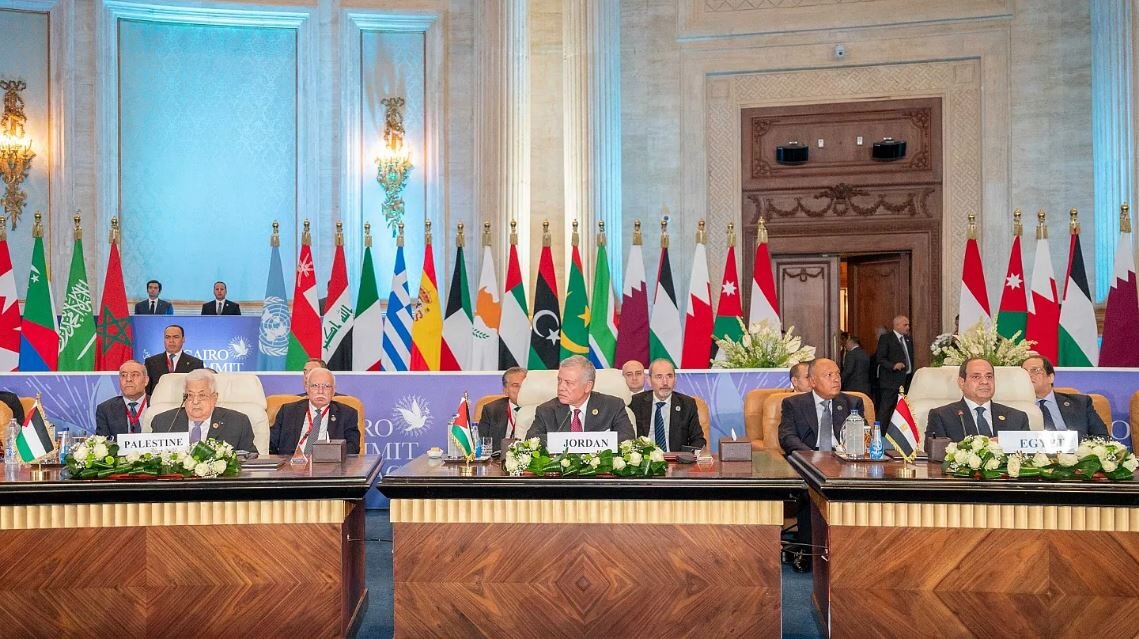Cairo summit raises concern over absence of key players, casting doubt on tangible results
Jordan King says the collective punishment of the besieged and helpless people of Gaza is a “war crime”.

TEHRAN - Leaders and high-ranking officials from various countries convened in Egypt for the Cairo Summit for Peace on Saturday with the stated goal of deescalating the current conflict between Israel and Palestinians and preventing a possible spillover in the West Asia region.
Attendees included representatives from Jordan, France, Germany, Russia, China, the United Kingdom, the United States, Qatar, and South Africa, as well as officials from the United Nations and the European Union.
On top of the summit’s agenda was devising a plan to address the humanitarian crisis in Gaza and revive peace negotiations between Israel and the Palestinians.
Arab leaders condemn Israeli crimes against Gazans
King Abdullah of Jordan condemned Israel’s bombing campaign against Gaza as a “war crime” and called for those responsible to be held accountable.
“All civilian lives matter. The relentless bombing campaign underway in Gaza, as we speak, is cruel and unconscionable on every level. It is a collective punishment of besieged and helpless people. It is a flagrant violation of international humanitarian law. It is a war crime. Anywhere else, attacking civilian infrastructure and deliberately starving an entire population of food, water, electricity and basic necessities would be condemned. Accountability would be enforced but not in Gaza,” the king asserted.
Egyptian President Abdel Fattah el-Sisi who has been under pressure by Israel and the U.S. to accept the 2.3 million population of Gaza as refugees, openly opposed such plans.
On Wednesday, he expressed his firm stance against any forced relocation of Palestinians to Sinai, emphasizing that the Egyptian people would vehemently oppose such a measure. He further warned that such a move would transform the Sinai Peninsula into a launching pad for attacks against Israel.
El-Sisi also called on Arab leaders to come up with a “roadmap” to end the “humanitarian catastrophe” in the besieged Gaza Strip. He also hoped that Arabs could help facilitate peace talks between Israel and Palestinians. He emphasized that a two-state solution would eventually be the answer to ending hostilities between Israel and Palestine.
Palestinian President Mahmoud Abbas also took part in the summit and requested the establishment of humanitarian corridors, emphasizing that Palestinians will not abandon their homes. “We will remain on our land,” he said.
Also attending the summit, UN Secretary-General Antonio Guterres called for an urgent ceasefire, highlighting three crucial steps to ease the crisis. The steps include the provision of immediate and unrestricted humanitarian assistance to the trapped civilians in Gaza, the unconditional release of all hostages in Gaza, and taking immediate and dedicated measures to prevent the escalation of violence, which according to Guterres is on the rise.
Summit overshadowed by absence of most relevant representatives
The summit has raised concerns due to the absence of representatives from Israel and Hamas, as well as senior U.S. officials. Also, no representatives from Syria and Lebanon, which share borders with the occupied territories, and Iran, which is regarded as one of the key players in the region, took part in the summit.
This raises questions about the effectiveness of the summit in achieving tangible results without the involvement of the conflicting parties. Some view the summit as an attempt by Arab states to address criticism at home, particularly regarding accusations of inaction in response to Israeli crimes. Several Arab countries have been the scene of mass protests in support of Palestine in recent days, including Egypt and Jordan.
The ongoing conflict between Israel and Palestinians began on October 7 when the Hamas resistance movement carried out a surprise offensive into the occupied territories via land, sea, and air. The number of Israeli casualties stands at over 1400, with approximately 200 taken captive.
Israel has responded to the Palestinian operation known as the al-Aqsa Storm with what many perceive as a disproportionate reaction. There are concerns that Israel's actions in Gaza indicate a desire for a full-scale genocide, as the regime has deliberately targeted schools, hospitals, churches, mosques, and other civilian sites. Israel has openly boasted about its actions on social media and launched a massive propaganda campaign against Palestinians alongside its relentless bombardment of Gaza. The Gaza Strip has been placed under a "full siege," with Israel disseminating misinformation about Palestinians and downplaying its own crimes. It is worth noting that Israel enjoys support from social media platforms and Western media outlets.
Some reports and videos taken of Israeli strikes show the regime has also been using white phosphorus bombs against Gaza, committing yet another war crime against impoverished Palestinians in the territory that has been labeled as the world’s biggest “open-air prison” in the past 17 years. So far Israeli attacks have killed nearly 4,500 Palestinians and injured thousands of others. So far, hundreds of thousands have been displaced as more than 1.3 million people in northern Gaza have been asked to evacuate their homes. Even those leaving their homes are not safe from being targeted by Israeli fighter jets. With over half of Gaza’s population consisting of children, Palestinian casualties so far are mainly made up of kids and also women.
The regime also seems to be preparing for a ground offensive inside Gaza, which many fear could lead to an even bigger blood-shed of the civilians that live in one of the most densely populated areas of the world.
Leave a Comment